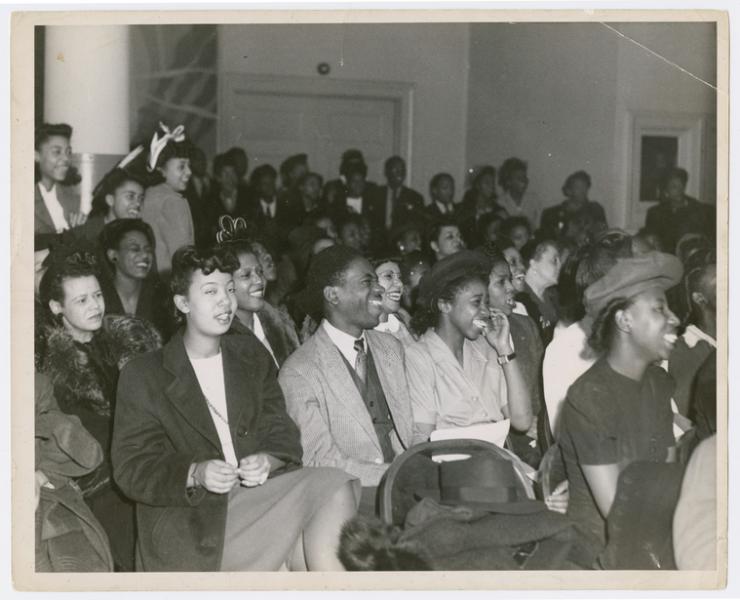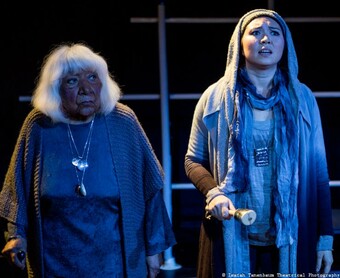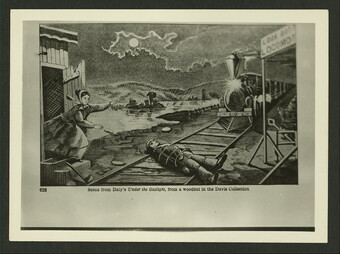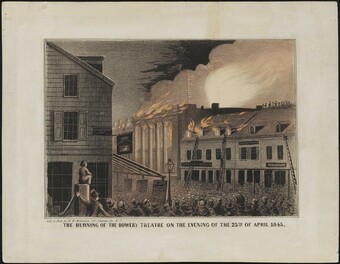Theatre and Civil Rights: Dr. Julie Burrell on the Importance of A Medal for Willie
Theatre History Podcast #62
How did African American theatre and the struggle for civil rights intersect? For many critics in the 1950s and ’60s, they didn’t, at least not in a meaningful way. But, as Dr. Julie Burrell points out in a recent essay for Black Perspectives, the blog of the African American Intellectual History Society, some of the works produced in the 1940s and ’50s are far more radical than we might expect. She explores the story of William Branch’s A Medal for Willie, a 1951 one-act that impressed Lorraine Hansberry and demonstrated the subversive potential for Black theatre before the 1960s.

Links:
- You can read Julie’s piece here, and explore Black Perspectives at its website.
- To learn more about Julie’s work, visit her faculty profile at Cleveland State University and follow her research on Twitter.
- Learn more about William B. Branch and his career.
- Learn more about the American Negro Theatre from this New York Public Library webpage (you can find images and documents from the ANT at the NYPL’s digital portal).
- For more information on Harold Cruse and the legacy of his book The Crisis of the Negro Intellectual, read this 2007 interview with Dr. Peniel E. Joseph in Inside Higher Ed.
Additional Reading:
- You can find A Medal for Willie in Black Drama Anthology, edited by Woodie King and Ron Milner.
- The Crisis of the Negro Intellectual, by Harold Cruse
- The Other Blacklist: The African American Literary and Cultural Left of the 1950s, by Mary Helen Washington
- The American Negro Theatre and the Long Civil Rights Era, by Jonathan Shandell
- Crosswinds: An Anthology of Black Dramatists in the Diaspora was edited by Branch and contains his play In Splendid Error, which Julie references in the episode.
You can subscribe to this series via Apple iTunes, Google Play Music, or RSS Feed or just click on the link below to listen:
Transcript:
Michael Lueger: The Theatre History Podcast is supported by HowlRound, a free and open platform for theatremakers worldwide. It's available on iTunes, Google Play, and howlround.com. Hi, and welcome to the Theatre History Podcast. I'm Mike Lueger. Discussions about many of the best-known plays by African American playwrights have been vexed about questions about where they fit into the social and political landscape of the United States. Was a mainstream success like Lorraine Hansberry's A Raisin in the Sun a victory for progress, or was it an accommodation to the established order? That's the sort of question that Dr. Julie Burrell has been engaging with in her research, most recently in an essay for Black Perspectives, the blog of the African American Intellectual History Society. She looks at the example of William Branch's one-act play A Medal for Willie and finds in it an example of how seemingly mainstream theatre could advance radical critiques of American society. Julie is an assistant professor in the Department of English at Cleveland State University, where she's developing a manuscript entitled Staging Black Freedom. Julie, thank you so much for joining us.
Julie Burrell: Hi, Mike. Thanks for having me.
Michael: Who is William Branch, and what is A Medal for Willie about?
Julie: Yeah, so William Branch is an African American playwright, activist, and he went on to become a television executive at NBC. He was born in 1927. He attended the famous storied Dunbar High in Washington, DC, and how he became involved in theatre was that he joined the cast of the American Negro Theatre's Anna Lucasta, their smash Broadway hit, when it was on tour in Chicago. He was at the time a college student at Northwestern, and he was encouraged to do so by the actor and activist Canada Lee, and so there he met people involved in black theatre, like Canada Lee and Ossie Davis. He was blacklisted after A Medal for Willie, and I'll tell you why in a moment, but he continued to write plays through the 1950s.
People might know his play called In Splendid Error, which is about the debate between Frederick Douglass and John Brown over whether or not to use violent tactics to end slavery. It was published in anthology, and I'm forgetting the name of it now, but it is anthologized, and you're able to find it, but like so many other black playwrights, he really hasn't gotten the attention that he deserves. Thankfully, thanks to anthologies like Branch's own Black Thunder, which was published in ’92, we can still find some of these plays, but many of his plays were not published, and they're really difficult to find.
A Medal for Willie, it was the [inaudible 00:02:53] play that he wrote, and he wrote it soon after moving to New York City. It was wildly popular, and it's in a southern town that's called Midway, and it takes place mostly in the Booker T. Washington High School. It centers on a posthumous medal ceremony for Willie Jackson, Corporal Jackson, who was killed in action during the Korean War. We start off in the auditorium of Booker T. Washington High School, and then Branch presents a series of vignettes that paint a picture for us of what life was like for Willie in the town of Midway. It's kind of narrated by Willie's teachers. In that way, it's a bit like Thornton Wilder's Our Town, and I'll talk about its kind of metatheatricalness in a moment, but it's condensed into one day, and it's a one-act play with a series of vignettes.
Through these scenes, we see instances of racism. We see the racism of the visiting military leaders that are going to present the medal to Willie's mother. We see, we get a glimpse into the local newspaper, and we see the kind of stereotypes that are created by the newspaper. We see a scene in which we see the hypocrisy of rich whites whose own sons get to escape the draft. We also see a scene in which Willie's girlfriend nearly is raped by a white man, and we see the sort of danger that black women are in by predatory white men. The play ends with the medal ceremony. What happens is that Mrs. Jackson is supposed to give this speech, and she's written, they've written a speech for her, the principal of Booker T. Washington High, and she refuses to read it. She says, "I can't go through with this. I can't go through with this big lie," and she says something really radical at this point. She says that Willie died fighting in, quote, "the wrong place," and she says that he should have had his machine gun here in the United States in the South.
What she's basically saying is that the men that she's surrounded by on this stage in the auditorium at the school who are the visiting military leaders, the white mayor of the town, and the black principal of Booker T. Washington High, she says that these men are essentially the enemies of people like her son, and not the combatants in the Korean War. Then what she does is throws the medal at the men and then storms offstage. It's this really amazing scene of protest, the culmination of this play. Here, it might sound familiar to people who are familiar with black protest to the Vietnam War, so Branch is articulating here what actually will become more common during the Vietnam War, something articulated by Muhammad Ali, among others, that black people shouldn't be fighting against people who are also oppressed by the white imperialist regime of the United [inaudible 00:05:42].
What I find most interesting about the play, and what I talk about in the essay, is its metatheatricalness. The play opens without a curtain in full view of the audience. We see the stage being set for the medal ceremony, and then it ends after Mrs. Jackson's speech with two janitors kind of striking the set. What this says to me is that Branch is acknowledging the role that black people might play or not in sort of propping up the Cold War American state. At this point, it was essential to the United States that black Americans looked happy, even though Jim Crow was still very much the fact of life for black Americans at the time.
What Branch is saying in this play, and so are his peers like Alice Childress and Ossie Davis in their plays, what they're saying is that performance helps to kind of propagate the idea of black contentment with Jim Crow. I think that's why Paul Robeson was so dangerous at the time. Right? He wouldn't play along with the Cold War United States. He was always saying to anyone who would listen on the global stage that the United States was a racist state. I think that's why his passport and Du Bois' passports were taken away.
What I find also really fascinating about this moment of metatheatricalness is that Lorraine Hansberry was in the audience watching this play, and she wrote a glowing review for it for Masses & Mainstream, which was the Communist cultural journal at the time, but she didn't like the kind of metatheatre on either end, the framing moments of this play. I really love that moment in her review, because what it says to me is that Hansberry is kind of at the time developing her own aesthetic that's a little bit more Seán O'Casey and a little less Bertolt Brecht, but she did really love A Medal for Willie.
Michael: Now, you mentioned Lorraine Hansberry. You mentioned Paul Robeson. I'm wondering how this play and how theatre in general fit into the larger civil rights movement of the 1950s and 1960s.
Julie: Yeah. That's a really great question, and one that I think hasn't really been answered fully and one that I'm attempting to answer. I think we tend to think of Lorraine Hansberry's A Raisin in the Sun as really the first great civil rights play, or the first civil rights play, and of course it really is one of the most important pieces of civil rights literature, but what I'm working on now is looking at plays that might not necessarily fit under the civil rights umbrella neatly. I'm thinking through how we can complicate what we mean by civil rights theatre by considering plays like William Branch's as kind of part of the civil rights movement.
I'm doing this inspired by what historian Jacquelyn Dowd Hall calls the long civil rights movement. She sees, and other historians of the long civil rights movement, sees civil rights as a much more expansive movement than we think. It encompasses the old left of the 1930s and struggles for things like economic security, labor unions, anti-colonialism, so essentially left-wing fights in conjunction with what we think of as traditional civil rights struggles for things like education, equal housing, jobs, desegregation, etc.
When we look at a play like Medal for Willie, we can see that Branch is bringing together both a critique of Jim Crow, but he's also bringing a critique against the Korean War into it, so he's kind of linking racial protest and anti-imperialism in a way that is really kind of old-school leftist. We actually see this thing through the 1940s, through the 1950s, and it was, we see through this time period a really influential black off-Broadway movement that is critiquing both Jim Crow and racism and also Cold War anti-communism, and even saying that we can't even look at anti-racism without also taking a look at the Cold War and anti-communism as well, so they're basically inseparable at the time.
Michael: Your essay in Black Perspectives mentions a debate sparked by Harold Cruse about black theatre and intellectual life. Can you tell us who Cruse was and what the whole debate was about?
Julie: Sure. Harold Cruse, and I should say my essay was responding to a [inaudible 00:10:03] round table that was published on the websites of the Society for US Intellectual History and the African American Intellectual History Society, both excellent sites. My essay was responding to a round table about Cruse, and one of the things I say in my essay is that Cruse is really one of the great theatre historians or theatre critics of the mid-twentieth century. I don't think he gets enough credit for that, but Cruse was a writer. He was an academic. He was a social critic. If people know him, it's probably for his book The Crisis of the Negro Intellectual, which was published in 1967. It was and is a massively influential text about the culture of the civil rights movement. For the purpose of theatre historians, The Crisis paints a picture of what black theatre and Harlem culture was like in the 1950s, the 1940s.
One of the things Cruse does in The Crisis is try to speak to the question of why was it that during the most generative years of the civil rights movement, why wasn't there more specifically black culture, black culture that was successful and that was lasting? One of the answers he comes up with is that black institutions didn't develop among and for the black community. He says they were too focused on integration, and he calls integration assimilation, so he really critiques people like Hansberry and James Baldwin and others, and organizations like the Committee for the Negro in the Arts, which produced A Medal for Willie, for being too dominated by what whites wanted and not focused enough on the black community.
Michael: How does A Medal for Willie relate to Cruse's critique? I mean, what does it say about the kind of theatre that he is expressing these doubts about?
Julie: First, I should probably say that Cruse has a point. The American Negro Theatre, the most important black theatre group of the 1940s, they often, not always, but often put on shows written by whites, so they, in some ways, I think, failed to incubate black writing talent. Cruse was a frustrated playwright himself. He sort of felt shut out of these institutions, which he found both elitist and assimilationist. Cruse's critiques are somewhat warranted, but I also, in this essay, I'm trying to complicate Cruse's picture of the mid-twentieth-century black theatre. I believe it to be less assimilationist than he thinks, and I think it actually pushed back against white leftists and orthodox Marxism in a way that he doesn't get the credit for.
I think one really interesting element of this theatre of the ’40s and ’50s, and the ’60s too, that often gets overlooked is actually its feminism and what would become, come to be called black feminism. I think Branch is a really good example of a kind of unsung feminist playwright. His character, Mrs. Jackson, is really one of the most radical black women on stage until we get to Alice Childress' plays, but he also writes these really interesting and sensitive portrayals of black women in plays like Baccalaureate, which has been anthologized. He wrote a play called Light in the Southern Sky, which is a television drama about Mary McLeod Bethune. He wrote a play called To Follow the Phoenix about Mary Church Terrell.
At the time, he's developing these black feminist ideas amidst an unprecedented upsurge in black female leadership in the arts in Harlem. Alice Childress is heading the theatre committee of the Committee for the Negro in the Arts. She's [inaudible 00:13:40] one that puts on A Medal for Willie. Gertrude Jeannette has founded the Elks Community Theatre during this time, and she's a playwright and theatre producer as well. What's also important to remember and that Cruse doesn't really talk about is how feminist these works were in the mid-twentieth-century American theatre.
Michael: How has your research into A Medal for Willie and the controversy over Cruse's ideas caused you to view better-known plays by African American authors? Has it caused you to reconsider them or look at them in a new light?
Julie: Yeah. I think so. One thing it's done for me is to inspire a return to the archives, so I think we need to both understand that Cruse's concerns are legitimate from the place and time that he's writing, but it's also important to find out what the playwrights and artists at the time were thinking, what they were feeling, what they were doing at the time. Why did they want to work with whites? Did they want to work with whites? Why did they try so hard to integrate their artistic institutions rather than, say, like a Mary [inaudible 00:14:49] would, right, that, "I can't produce my art with white people, and I can't produce it for white people"?
What were they thinking and feeling in the ’40s and ’50s, and so one of the things I've learned from this return to the archives is that there was no really integrationist or assimilationist consensus as a whole, but artists like William Branch, and Alice Childress, and Langston Hughes, and Lorraine Hansberry really believed, in the midst of the Cold War, they really believed that a better world was possible. They struggled really hard for a more just and equitable society, and they really continued to put their faith in the Left and in the working class. For this kind of critique, if people are interested, I would direct them to Mary Helen Washington's The Other Blacklist, which is really the exemplar of this kind of archival return. Her book is a really brilliant analysis of the leftist archives.
For a while, I think people thought anyone who joined the Communist Party or expressed Communist sympathies were party hacks. Right? They were doing this under the direction of the Communist Party, not because they actually believed it, but I think what a return to the archives does is help us see that, no, these writers actually believed in the Left well after they left the Communist Party, or through the height of the Cold War.
Michael: We'll post a link to Julie's essay, “Civil Rights Playwrights as Black Intellectuals”, in our show notes. Julie, thank you so much for introducing us to A Medal for Willie and for explaining its importance in the context of the civil rights era.
Julie: Thank you. It's been a real pleasure.
Michael: If you'd like to continue today's conversation, please visit howlround.com and follow HowlRound and @TheaterHistory on Twitter and Facebook. You can also visit our website at theatrehistorypodcast.net, where you can find links to all of our episodes, and you can email your questions and comments about the show to [email protected]. A big thank you to the staff at HowlRound who make this show possible. Our theme is “The Black Crook Gallop,” which comes to us courtesy of the New York Public Library Libretto project and Adam Roberts. Thanks as well to [Tip Cress 00:17:03], who designed our logo. Finally, thank you for listening.











Comments
The article is just the start of the conversation—we want to know what you think about this subject, too! HowlRound is a space for knowledge-sharing, and we welcome spirited, thoughtful, and on-topic dialogue. Find our full comments policy here